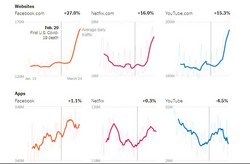In today’s technology-dependent society, it’s nearly impossible to unplug from electronics and take a break. Technology today is used for both business and pleasure, especially when the COVID-19 pandemic pushed students further into the virtual world.
Phones are students’ main source of communication, computers are mostly used for work, and televisions are meant for entertainment. All these electronic devices can be overwhelming to the human body, and remaining plugged in can be detrimental to one’s mental health.
According to the New York Times, internet usage spiked during the pandemic—Facebook use increased by 27 percent, Netflix by 16 percent, TikTok by 15.4 percent, and YouTube by 15.3 percent. Meanwhile, video conferencing apps have also been seeing an influx of users as people find digital ways of staying connected.
Because most college students grew up experiencing the evolution of technology, and now have seen a spike in usage during the pandemic, it can be hard to realize how much time they are spending on electronics. Even before the pandemic, people’s heads were buried in their phones whether they were walking, with friends, eating, or doing schoolwork.
“It is important to unplug from technology,” said Christopher Mckittrick, Assistant Director of Counseling & Psychological Services. “With the current state of everything, we tend to rely on the virtual world to supplement things that are missing from our physical world. By unplugging from tech (for at least a little while), we allow our mind and body to reconnect. When we use Zoom, Netflix, Hulu, and other services, we tend to retreat into our mind and often forget to listen to our body and physically feel what is around us.”
He added, “For our own physical and emotional health, it is important that we connect to our physical body. When we tend to retreat or reside primarily in our mind, we can easily give a lot of fuel to feed anxious or depressive thoughts and, if we lose our footing, we can get lost into intrusive thoughts that tend to increase our stress and decrease our mood.”
These anxious and depressive thoughts can arise now that school and work overlap into personal lives more than ever. What used to be a typical nine to five is now a job done at home from the moment you wake to the moment you lay down to sleep at night.
“Visual and auditory sensory overload is real. We do our best thinking and creating when we are able to be in a quiet space and just be.” said Elizabeth O’Brien, Director of the Education Opportunity Fund. “Unplugging doesn’t have to be forever. But it should be intentional.”
Students should not have to be forced to unplug. In many cases, students have to force themselves to take that much needed technology break because they cannot tear themselves away from their devices. Students often find it difficult to find the time to unplug. Part of the challenge is finding time to unplug while also keeping up with their studies.
Tabitha Rahman, a senior English education student, said, “It can actually be super difficult for me to unplug. Being on my phone definitely takes up a lot of my time. I just try to turn my phone off when I do my work and eliminate all other distractions.”
By unplugging, you can appreciate people and the world around you more than you could stuck behind a computer or through the lenses of the camera on your phones. Many people think unplugging means just sitting there staring at the ceiling because they cannot imagine doing something without their devices. Some of the best times in one’s life will be away from technology. The moments you don’t capture on video or in pictures, but by living in the moment.
Josie Gargiulo, a senior English student, shared some ways she unplugs from technology. She said, “When I have time to unplug and step away from the screen for a bit, I love to walk my giant newfoundland dog Ben to the beach. Even when I have a heavy workload with school or feel overwhelmed, going to the beach always helps clear my head. The beach will forever be my favorite place to unplug.”
Katherine Lubnewski, Ph.D., Associate Professor of Special Education, said, “It’s okay to not respond to e-mails after a certain time or to give yourself a ‘day off.’ During that time, really make an effort to not to check your e-mail and go and do something active that you enjoy like going for a walk on the beach, exercising, cooking, checking out a new area, etc. I feel like you have to listen to your body, it will give you clues like it’s sore, thirsty, eyes have a hard time seeing…those are the times that it needs a break. I also think that for every hour spent on technology you should get up and walk around for 10-15 minutes.”
There are many opportunities for college students to unplug and unwind. For example, a night of playing board games can be filled with undeniable happiness and true laughter. Most college students are unbelievably competitive and will keep the night honest fun and interesting.
Many art museums are either free or offer discounts for college students. You can explore great paintings at the Modern Museum of Art, learn about new photographers at BRIC House, or take a walk through the New York Botanical gardens feeling, smelling, and enjoying the displays created with the different greenery.
The college community provides many unique opportunities for technology breaks. The University often invites students to Broadway shows, host guest speakers, invite entertainers like comedians and hypnotics to campus, and have a lively athletic scene—all of which allow students to unplug so they don’t miss out on life.
IMAGE TAKEN from the New York Times




